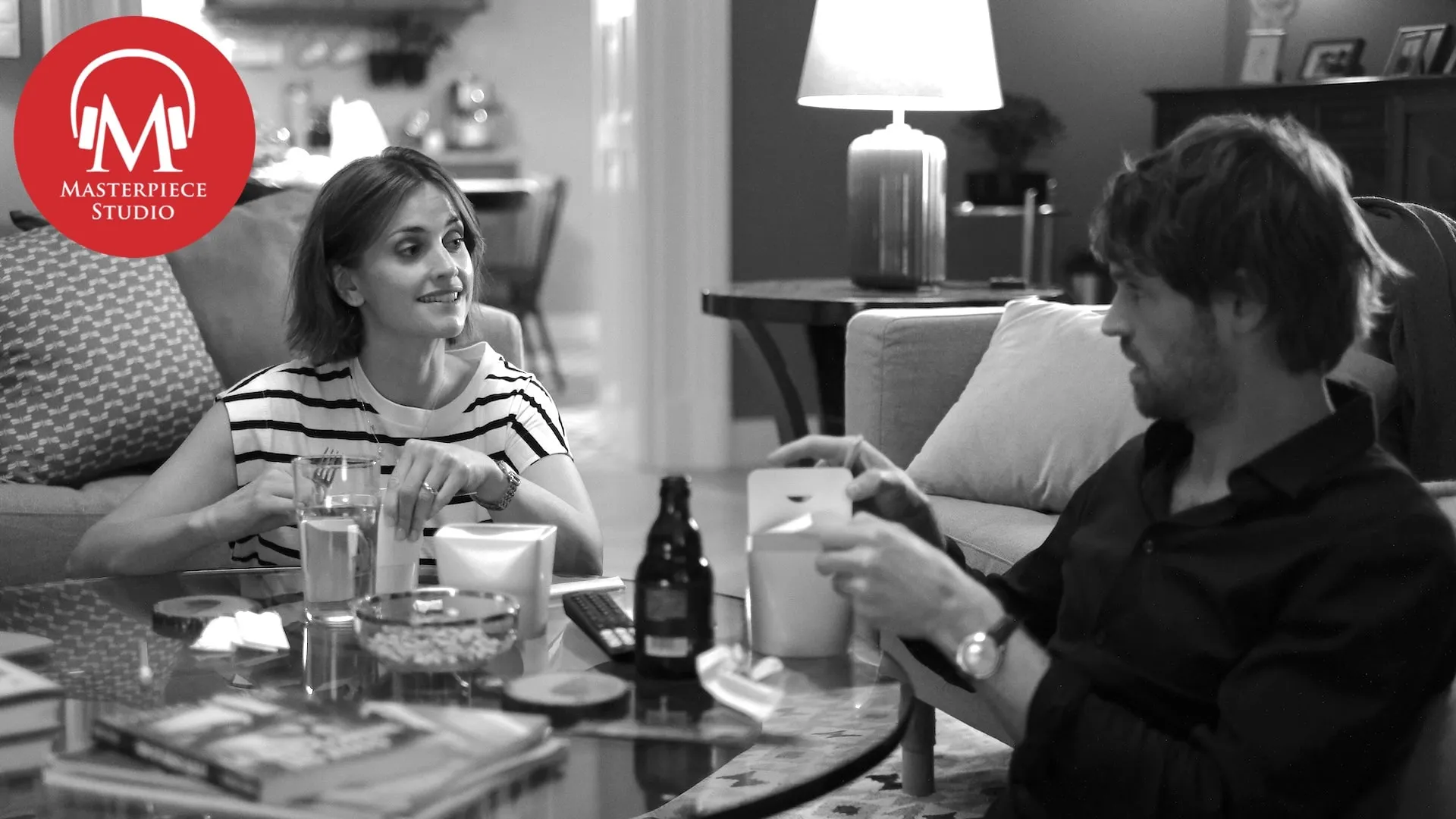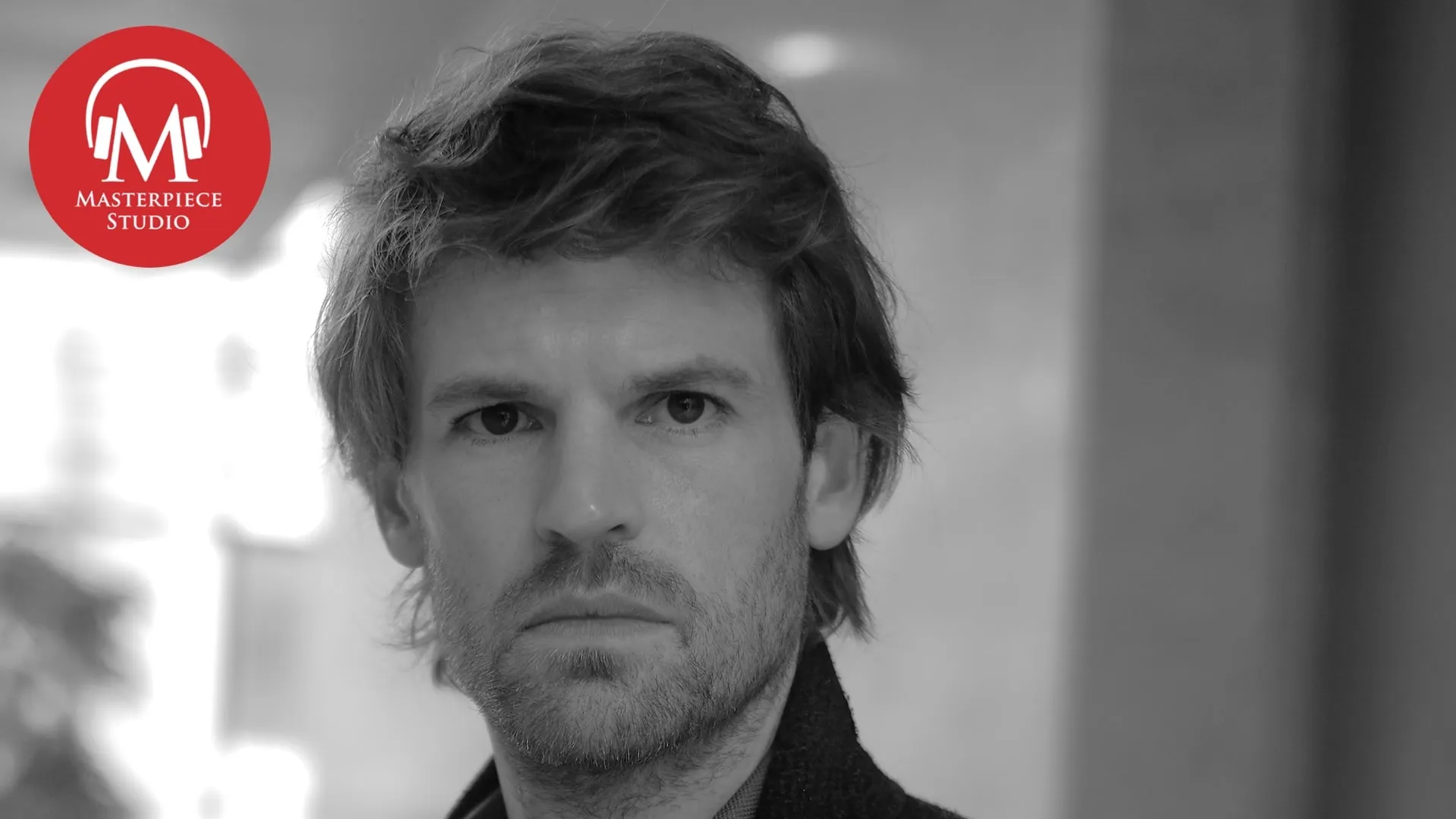
Stefanie Martini, Maigret | MASTERPIECE Studio
Released October 27, 2025 22:00
WARNING: This episode contains spoilers for Episode 4 of Maigret.Actor Stefanie Martini’s Louise Maigret may just be the most patient woman in Paris, forever adjusting to her husband Jules Maigret’s demanding work schedule. But she’s a professional in her own right, working as a psychiatric nurse helping those in need. In this conversation, Stefanie returns to the podcast to discuss themes of hope, loss, and new beginnings through her character, Madame Maigret.
This script has been lightly edited for clarity.
Jace Lacob: I’m Jace Lacob and you’re listening to MASTERPIECE Studio.
When we first meet Louise Maigret, the ever patient and understanding wife to Inspector Maigret in Episode One, she’s just getting home after a double shift at the hospital where she works as a psychiatric nurse. Her day ends as her husband’s begins. But don’t let these two passing ships fool you, Maigret and Louise’s healthy marriage is built on mutual support and understanding. And now this happy couple is looking to transform their family from two members to three.
CLIP
Maigret: Ooh, sweetheart.
Louise: Progesterone. Like injecting motor oil. But still, this time it will work.
And much to their delight, it does work.
CLIP
Louise: Dr. Klein confirmed tomorrow morning. You’ll be there? To see the heartbeat?
Maigret: I would not miss it for the world.
Tragically, they learn during the ultrasound that they have lost the baby. This devastating news rocks Louise to her core, but she finds comfort in a case her husband is investigating: Maigret’s search for missing teen influencer Layla. Louise finds solace and escape in watching Layla’s social media videos.
CLIP
Louise: Hello. I didn’t hear you come in.
Maigret: Layla.
Louise: Don’t worry about me, Maigret, I’ll get back in the swing. I just need to mourn for a little bit. She helps.
Today, we’re joined by Maigret star and MASTERPIECE Studio returning guest, actor Stefanie Martini to discuss themes of hope, loss, and new beginnings through her character, Louise Maigret.
Jace Lacob: This week we are joined by Maigret star Stefanie Martini. Welcome.
Stefanie Martini: Thanks, hi.
Jace Lacob: So you might be the first actor that comes to mind on MASTERPIECE playing two vastly different characters back to back on the same night at 9pm and 10pm. What was it like exchanging Marnie's big 1980s wig for the calm and controlled Louise Maigret?
Stefanie Martini: I know, I was thinking about that, and I was like, I'm glad they're very different. They're very, very different people. But yeah, at first I was like, okay, okay, I'm wife-ing. This is my stage of life now. I'm going, how was your day? How were your dreams? And what's drawing comparisons? But they’re such deeply different people and very different relationships. It didn't feel the same at all.
Jace Lacob: Madame Maigret is a beloved character in the Georges Simenon oeuvre. She's a constant in Maigret's life, tempering him and offering him a beautiful companionship in marriage. What did you make of the character when you first read for her?
Stefanie Martini: Well, if I'm totally honest I thought, this isn't a long stretch for me. I thought I could do this well. And that's genuinely what I thought because I was like, I am, I think as a person, I care a lot about the people in my life. You know, she's a listener. I'm also a listener. And I also thought, how lovely to portray a relationship on screen which is functional, and the drama isn't really about them, which is different to anything I've done before.
Jace Lacob: In this modern version of Maigret, your Louise Maigret isn't just a helpmeet to Maigret, but has a life of her own. She works as a psychiatric nurse and has clearly honed her sense of patience through years of professional duty and marital routine. What do you make of Louise's patience, particularly when it comes to Maigret?
Stefanie Martini: I think she really respects him. I think she respects his intelligence. I think she respects his process. I think she has a real deep understanding of him and where he's been. The way I see it is the way she loves him is she sort of sits there and holds it for him, like, lets him figure it out, prods it all around in terms of his cases. But yeah, I just feel like they really know each other really well and they get each other really well. I don't know, it’s that feeling when you're like, I know where this is coming from, I understand where this is coming from. So anything that is maybe slightly annoying, like the amount of phone calls he gets at important moments…
Jace Lacob: I mean, he leaves. He leaves when they’re meant to be celebrating the fact that Louise is pregnant. He takes a phone call and leaves. Is she the most patient woman in Paris? Does she just sublimate her irritation, or does she excuse her husband's interruptions? I mean, where does this patience come from?
Stefanie Martini: I think she knows it's part of him. And I think she's so secure, she's not threatened. She doesn't see it as, oh, you're leaving so you don't love me. You're leaving me so I'm not important. She doesn't see it like that. She knows how important she is. She knows that he couldn't do any of this without her. She knows that. And also that his job is very demanding, very important. But she knew that when they met each other.
So she just gives him a huge amount of freedom. And yes it's annoying, but I also think underneath that it's just a huge trust and respect and freedom that she gives him in allowing him to be himself, which is someone who needs to do this and needs to follow things through and needs to go to the end of it. And I think she was like, well, that's part of the package, that's who I've married, that's who I love. So if I'm going to be with this person, I'm not going to try and change them, is how I view it.
Jace Lacob: Most detective dramas, particularly those that don't fall into that sort of ‘cozy’ category will often have their male leads unattached or be womanizers that are cheating on their wives. But Maigret is defined by his marriage to Louise. What do you make of that rapport, then, the tenderness that they have in their domestic scenes together?
Stefanie Martini: I love it and I think that's slightly what makes it different, to be honest. Because he's so unflappable, unreadable, kind of an enigma everywhere else, we tried to really lean into the idea that they're a bubble together and the home is his safe space and her safe space. And there's a lot of talk about them being introverts; the couple that are just really happy in each other's company. But maybe they're talking, maybe they're not talking. Maybe they're reading a book, maybe they're in completely different rooms, but they're together and they don't need the outside world. They're really content with each other. And that was lovely to play with.
Yeah, and it did feel like that. I think it was a real joy to just do scenes where you're moving around each other in the space and you're picking food up and you're talking while you're eating, and you're so familiar with each other that everything is subconscious in your motor brain. Does that make any sense? You're not thinking about it, you're just…
Jace Lacob: Doing.
Stefanie Martini: Yeah, just doing. They're just breathing and around each other, and it's kind of no effort to be with each other. And then other stuff, life stuff, that's the stuff that's hard. But them being together is not hard.
Jace Lacob: Maigret is just Maigret. He's not even Jules to Louise. How does she see his work, his sense of self when he doesn't even use his first name, even with her?
Stefanie Martini: Yeah. So that's a really big thing in the books. And at the beginning I didn't really interrogate it that much. I was like, oh, okay, okay, that's what it is. But I guess he's guarded in a way. And maybe she's took it on as a kind of joke around that and it stuck. I don't feel like he hides anything from her, actually. So I think if she wanted to call him Jules, I think she probably could, but it wouldn't feel like him.
Jace Lacob: Our introduction to Louise is when she awakens Maigret after a double shift. The show revolves around Maigret's job. We don't get to see Louise at her place of work. With her career, does Louise feel a similar sense of calling as her husband, that her job is similarly a vocation, that she similarly is also solving people?
Stefanie Martini: Yeah, I think you've hit the nail on the head there, exactly it. The reason he's such a brilliant detective, he's got empathy, he's got heart, he's curious. And I think she's the same, it's just in a different setting. And I think that's really something they connect over. And you can see it in the way they talk to each other about her work, his work, how they're equals, how he really respects her opinion. Because he knows that maybe she'll see something that he's missed or vice versa. And yeah, I think the thing that connects them is the real care and interest in other people and how brains work and minds work and hearts work and what people are about.
Jace Lacob: Maigret and Louise's attempts to conceive provide an emotional spine to Series 1. Maigret works as a homicide detective, Louise a psychiatric nurse. Knowing what they know about humanity, you'd expect them to not want children. What do you see behind their desire to have a child?
Stefanie Martini: I don't know. That's really interesting. Well, I think they're hopeful, right? I think if they weren't hopeful, then why would they do what they do? I think the thing is, they can both hold and look into the darkness of humanity and society and those really hard bits and bleak bits that drive people to do terrible things. With each other I think they also see the lightness and the hope and that is kind of a lot of the reason how I interpret people wanting to have kids, right, is hope for the future and believing in something good. And I think they can have both. I think they see both. I think they understand both. And I think that's why they want a family.
MIDROLL
Jace Lacob: And we’re back with actor Stefanie Martini. Louise and Maigret’s excitement to hear their baby's heartbeat is shattered when they learn Louise has miscarried. She says just very simply, “We will try again.” Louise is so pragmatic about it, but also so full of hope. How challenging was it to balance Louise's sense of heartbreaking loss with her innate optimism, and this being the first scene that you're actually shooting with Ben?
Stefanie Martini: Yeah, it was funny as well because Ben was just stationed at that bar for the whole day, and it was so hot and people were just coming up and acting at him, including me. But I think it was an interesting first scene to shoot because it grounded it. It kind of grounded the whole thing for me. It was quite intimate, you know, it's a shared loss. It's a huge shared grief. And that, as the first thing, means that everything sort of came from that, which was really useful.
But I just in my head, I'm like, she's just not someone who wallows in self-pity. She's practical, she's pragmatic, and she allows herself to feel things, but also doesn't… I mean, you see, later in the episode, she finds it hard to deal with and has to occupy her mind in different ways.
Jace Lacob: She does, though. She's almost superhuman in her resolve to try again, she says, “I just need to mourn for a little bit.” And she finds watching videos of the missing influencer Layla to be therapeutic. Why, in this particular moment of loss and grief, is she so drawn to these videos and to Layla?
Stefanie Martini: I think because she's like, where can I be a mother? She's searching for somewhere where she can be a mother. I think she knows that she would be a brilliant mother and she's with the person she wants to be a mother with. And they've been planning it. They've been painting a room. They've been probably ordering things and telling friends and thinking it's finally happened. And then for that just to have completely disappeared, there's still this instinct, I guess, looking for somewhere to go. And Layla is such a bright, gorgeous person that I think she ends up really projecting onto her in quite a big way.
And is also very aware of what she's doing at the same time. That's what I think is quite interesting about it is her self-awareness going, yeah I'm going through this thing, but I'm not lost in it, I'm just going through it. Oh, I'm projecting onto this young girl who I am imagining could have been my daughter. And I'm trying to do something to affect that, because I can't affect what's just happened to us. And I think all these things make complete sense to her. She's not bewildered by why she's doing this or why these are her instincts. And it's where she's going, but she's allowing it and she's aware of it.
Jace Lacob: The return of Sophie de Saint-Fiacre in Maigret's life brings with it complications. He says that Sophie was his first crush and Louise his first love. Sophie's also a mother figure, and if Louise were maybe to put on her psychiatric nurse hat, what does she make of Sophie and how she sees her husband's unresolved feelings about his home and the Countess?
Stefanie Martini: Well, I think she feels ultimately that it's something that he's going to have to work out; everything with his home coming up, how he hasn't been back in ages, how he's, I guess, avoiding looking at big things that mean a lot to him from his past. And as a result, she's giving leeway as to that. But as you can see later in the series, it becomes more of a present issue that she feels like she has to say something about. But yeah, I mean, she'd be insane if she didn't feel jealous and a bit insecure about it. But again, ultimately, she really trusts him. So there's kind of not as much drama there as if you were with a couple who weren't as solid.
Jace Lacob: Maigret blames himself for Fumal. He believes he has a deficiency of character, that he is somehow to blame for what happened between them.
CLIP
Louise: You’re upset.
Maigret: Yes. The baby of course. Then Layla, Fumal, Gaillardin... Everywhere, failure.
Louise: You’re doing everything you can.
Maigret: No, I could have done more for Fumal. But I didn’t. He was loathsome and I loathed him and I did a bad job. I remember how we used to laugh at him when he was a boy. Did we turn him into the man he was?
Louise: You were children: hardly responsible.
Maigret: Children know when they’re being cruel.
Jace Lacob: What does Louise see as her role here, to reflect Maigret or to refute him? Is she a mirror, or is she an emotional stopgap?
Stefanie Martini: I think she's listening. Because these are the things that he's not ever going to tell anyone else. She's letting him hear himself out loud. And I think also maybe stopping him going down a road which could be quite dangerous. Because I think again, she's aware of the slight darkness in him and where he can go mentally. So I think it's a space of, I'm listening to you and I'm not judging. But also, if I hear something that I think you're making up a narrative in your head which is harmful and going to hurt you, I'm going to refute it and argue against it, which I think is what she does. She's a bit like, no, reality, this is it.
Jace Lacob: Episode 4 brings my favorite scene in Series 1 as Maigret and Louise meet up with Layla outside the camper van.
CLIP
Louise: Do you have a message for your parents?
Layla: They used me, even when I begged them to stop, even when I disappeared, they went on using me. So right now I don’t want to talk to them. But I don’t want them to worry, so if you talk to them, tell them that I love them and I’m happy. But also tell them that I have the right to be forgotten, and I’m exercising it. Is that enough?
Louise: Yes. And if you were my daughter I would be so proud of you.
Layla: Do you have any children?
Louise: Not yet, but we’re going to.
Jace Lacob: How did you read that scene between the three of them?
Stefanie Martini: I read it as a kind of coming back together. I thought it was really lovely the way Patrick wrote it. So she is involved back in his life again. She's got a use. She's found some sort of positive effect she can have. He's included her and she gets to sort of resolve this journey that she's been on herself with Layla and the whole Layla case. And also, there's been distance between her and Maigret because of his work and because of her feelings, I guess, feeling too big? They haven't been on the same page, I think, for a while. So what was lovely about that scene was that it felt like a coming together again. I thought it was lovely.
Jace Lacob: Louise seems to radiate a sense of peace here. It's almost beatific. The audience is invited to believe in that optimism as well, to hope for the future for Louise and Maigret. How difficult was it to land that quality, precisely that Louise's optimism isn't foolish, but profound?
Stefanie Martini: Yeah, I just think she has a real belief that this is what their life is going to be for them. And I don't know, it is so hard for people who are trying to conceive when it's not working out. And I guess the way she sees it is she has a choice as to how she views it. And maybe this is her after she's been able to have her grief and have her mourning, and now she's back in a place of being able to hope.
Jace Lacob: You are quite a talented artist and painter. I am obsessed with your piece with the koi, the carp.
Stefanie Martini: Oh my God.
Jace Lacob: It's so beautiful. So, so beautiful. I love the pomegranates. As a creator living in a, we'll say a challenging time, what inspires you right now?
Stefanie Martini: Always, whenever everything is kind of really, really awful, it's my friendships and my relationships and nature, to be honest. Because we'll do whatever we want to do. And yet the trees will grow over everything. And in a hundred years none of us will be here and nature is bigger than us is sort of how I make myself feel better about everything that's going on. And yeah, human connection. That's the thing that always makes me, I don't know, feel grounded and feel inspired. I think as cheesy as that is love, you know? But genuinely, that's how I feel.
Jace Lacob: Stefanie Martini, thank you so very much.
Stefanie Martini: Thank you.
Next time, in 1980s London, DCI Brian Boyce does all he can to bring down the key criminals involved in the Brink’s-Mat robbery and gold-processing operation.
CLIP
Boyce: We need to build a conspiracy case against Noye. What's his neighbour saying about the box?
Goodman: That we’ve ruined her flowerbed digging it out.
Boyce: And?
Goodman: She doesn't know who put it there, but she does know without any doubt that it wasn't Kenneth Noye.
Jennings: So someone else put 50 grand of A24 notes under the geraniums?
Boyce: It's not enough.
Join us next week as we talk with the legendary Hugh Bonneville about playing the real-life detective Brian Boyce, and Hugh’s latest film, Downton Abbey: The Grand Finale.
Maigret Podcasts
2 More Podcasts
MASTERPIECE Newsletter
Sign up to get the latest news on your favorite dramas and mysteries, as well as exclusive content, video, sweepstakes and more.





